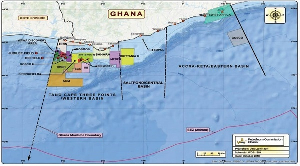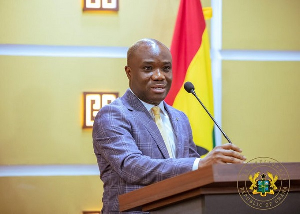This 3-part paper is being presented to Ghanaians on behalf of the Fair-Trade Oil Share-Gh PSA (FTOS-GH/PSA) Campaign, overseas branch. For more than 13 years, the campaign has advocated for the consolidation of the world standard Production Sharing Agreement (PSA) or Production Sharing Contract (PSC), a fiscal regime model adopted in PNDCL 84, for Ghana’s hydrocarbons; but, NPP and NDC politicians and their appointed decision-makers decided to ignore us.
At the start, we wish to inform the reader that neither this campaign nor any of its members receives, or has ever received, funding or any other type of support from any entity, organization, or government, for the campaign’s advocacy actions and publications.
While prospecting and exploration of oil in Ghana predated the founding of the NPP and NDC political parties, it is the NDC and NPP that engineered and foisted a royalty oil management system on Ghana, resulting in a huge loss of revenue to the public. Actually, in order to ensure Ghanaians receive a fair share of oil revenues as sovereign owners of the resource, commensurate with the already substantial public expenditures for exploration and collection of seismic data on Ghana’s oil fields, the PNDCL 84 mandated PSA-type oil contract system for Ghana was the obvious choice.
Under this, Ghana does not need to further invest in the development and extraction of the oil and gas being discovered (unless it wanted to take additional shares known as “participating interest”), contrary to the outright falsehood or misunderstanding being bandied around that Ghana must further invest in order to get any shares, and Ghana does not have money to invest. That is not the case under a truly competitive PSA.
In fact, Ghana would have started gaining even before the first oil. Under any truly competitive, arms-length, oil block award system, where negotiating officials are in fact protecting the public interest and not their self-interests, careers, etc., every model and final PSA contract contains a clause on a signing bonus for the benefit of the sovereign state, paid to the state’s bank account.
Bonuses are a prominent feature of every PSA contract/model we have reviewed, except for Ghana.
The South American nation of Guyana (population 830,000) received $18 million in PSA signing bonus from Exxon-Mobile and their sub-contractors – simply for signing and awarding an initial round of contracts on oil blocks offshore Guyana. (Drilling of oil actually would not begin in Guyana until 2019, 3 years after the payment of the bonus).
So, here is a question every Ghanaian ought to ask of Ghana’s elite oil contract negotiators, as the year 2024 comes to an end, 14 years after the first oil in 2010: From Cape Three Points to Deepwater Tano, to Off-Shore Keta Delta, to South Deepwater Tano, to Jubilee, etc., how much, tell us, Ghana Petroleum Commission, has Ghana gotten in bonuses for signing contracts and awarding oil blocks since 2006, and after drilling of oil in commercial quantities began in 2010?
Instead of oil being such a boon to Ghana, Ghanaians now have a system of oil contracts the elites in government call the “Royalty Hybrid System,” and tax laws that have resulted in huge loss of revenue to the public account over the years, as we had noted, informed the GRA under the whistleblower law, and even went to court to have investigated.
The reader should know that the foreign oil companies (FOCs) themselves (among them
KOSMOS, TULLOW, ENI, etc.), have long represented through various filings at the United States Securities and Exchange Commission (SEC), reports to investors and other parties, that the entire Ghana prospective petroleum profile has long been significantly de-risked, with expectations of even higher profits.
And so, following the just-ended Centre for Social Justice (CSJ) 14th Leadership Dialogue Series held on 28th August 2024, at the University of Ghana School of Law, we are yet again compelled to address some pertinent issues in response to current developments, specifically focusing on Act 919, a law that was characterized as “garbage” at a conference in Ghana, in 2017. We are in addition providing a general update on the FTOS-Gh Campaign to politicians, our supporters, and Ghanaians, at large.
For reference, the 28 August CSJ event, chaired by Dr. Christina Amoako-Nuama, was graced by several eminent personalities including Dr. Sodzi Sodzi-Tettey, Prof. Akilagpa Sawyerr, Prof. Percy Whyte, CEO of Stratcomm Africa and PR Madam for the FOCs and the wife of Mr. Tsatsu Tsikata, Esther Cobbah. Mr. Tsatsu Tsikata Esq, a lawyer and retired law lecturer, was the featured keynote speaker at the CSJ conference. His presentation was titled “Can Ghana Rise from the Ashes?”. Mr. Tsikata previously served as the founding CEO of GNPC. In attendance too was our very own Mr. Solomon Kwawukume, National Coordinator and CEO, Centre for Natural Resource and Environmental Management (CNREM).
We regret to inform Ghanaians that the Petroleum Exploration and Production Law, Act 919, was passed almost at midnight on 4th August 2016, without the benefit of adequate light. It is that oil governance law that was declared “garbage” at the conclusion of the 2017 International Ghana Oil Conference organized by the Lada Institute in conjunction with Open Society Foundation and the IBIS-Education for Development, at Labadi Beach Hotel, on 12th January, hosted by Professor Raymond Atuguba, Dean of the Faculty of Law, University of Ghana, Legon. The 2017 conference was attended by energy law authorities, professors, and other experts, among them:
• Professor Lucie White, Harvard Law School
• Wilham Forbath, Associate Dean of Research and Lloyd M. Bentsen, Chair in Law, University of Texas School of Law
• Professor Dennis Davis, University of Cape Town, and Judge, South Africa
• Professor Louis A. Horvitz, Harvard Law School
• Other experts from Tanzania --
• Mr. Tsatsu Tsikata, Esq. (attended briefly)
• Professor Raymond Atuguba, Dean, University of Ghana School of Law (Host/Convenor)
The characterisation of Act 919 is what our able and indefatigable lead advocate, Mr. Solomon Kwawukume, one of the two attendees privileged to pose a question, tried to draw the attention of the CSJ audience to, during the brief question-and-answer session, before he was abruptly interrupted. The sudden interruption appeared to create an impression in the minds of the CSJ audience that the “garbage” epithet for Act 919 was a Harvard University professor’s tag.
That is not the case, or the record. That was one of the conclusions of the conference. Actually, earlier in the session, Mr. Tsikata criticised some aspects of Act 919 that capped Ghana’s sovereignty and ownership rights. As such, he is definitely aware of the clauses of Act 919 signed by former President John Mahama.
Tsikata also observed that Kenyans once asked him about what the Ghana Hybrid System (foundation of Act 919) was, and, Tsikata, told them to concentrate on their Production Sharing Agreement (PSA). That was good advice and counsel. The PSA Agreement Tullow signed with the Kenyans gives Kenyans 60% of the shares, of which 5% government’s revenue share will go to the local Turkana community and 20% to the county government!
The FTOS-Gh PSA/Campaign fully agrees with the characterization of the Petroleum Exploration and Production Law (2016), Act 919, as “garbage” and have supported that position in writing and other manner of advocacy. (See “Reference” for links to some of our published reports).
A fact acknowledged by the Labadi Beach Hotel Conference in 2017, still remains.
Ghana has only gotten a mere pittance of all the millions of barrels of oil extracted since 2010 by the FOCs. Those companies are “managing” and exploiting Ghana’s oil reserves under the current Hybrid System. In fact, those companies are technically not “contractors” consistent with the world standard PSA contract system.
Further, as far as we can tell, while acknowledging that Ghana’s oil revenues have risen and dipped due to world market conditions and operational constraints, Mr. Tsikata neglected to present comparative data or provide any information on “Ghana-Take” versus “Foreign Oil Company-Take,” during his keynote address, though he narrated foibles the sector is facing under the additional mismanagement of the NPP administration.
This was a hugely important omission in a talk about Ghana rising from the ashes where income from depletable oil wells is a significant factor. The big omission does suggest to us that Mr. Tsikata, for reasons best known to him, has determined and concluded that Ghana is already receiving fair-share oil.
However, we of the FTOS-Gh/PSA Campaign beg to strongly disagree based on the data.
We have supported our position with the data analysis showing that Ghana had received less than 22% of the total revenue as of 2016, contradicting the claims that Ghana would be receiving over 40% made in presentations by the technocrats. Adding recent data, our review of 2010-2020 data shows that Ghana earned only $4.735bn out of a total of $23.30 billion, representing 20.31% of total revenue. We intend to publish additional data and information on the estimated losses to Ghana under the hybrid system, which we have captured annually since the first oil.
But one thing is still certain: Neither the GRA, the Petroleum Commission, Audit Service, nor the Bank of Ghana, have reported receiving a single pesewa in Oil bonus money on behalf of Ghanaians, even though many more oil contracts have been signed on behalf of Ghana since 2015.
And so, even as the attention of elites and ordinary Ghanaians now appears to demand an immediate response by the government on the destructive menace and harm of galamsey, we want to present this as further proof of how the mass of Ghanaians are being ripped off by colonial-style, obnoxious, and exploitative laws in Ghana’s oil sector, facilitated by a group of elites and politicians of various stripes.
The "garbage” oil law is in the fact that Ghana is not receiving anything near fair government take or share for the oil we are supposed to be the sovereign owners of. Ghanaians should not continue to accept the current, exploitative situation because there are better options along the lines of strong PSA contracts that other states (Angola, Guyana, Kenya, Uganda, Nigeria, etc.) have adopted, that Ghana could adopt.
The FTOS-Gh PSA Campaign’s able, lead advocate, a former senior accountant at Texaco
Head Office in Accra in the 1970s and later, a senior lecturer in Petroleum Revenue Management Accounting and Oil Profit Taxation at the current Lagos State University years before GNPC was established, is himself an authority on this subject.
He is the author of the book, Ghana’s Oil and Gas Discoveries: Towards Full Maximum Benefits. The revised edition published in 2012, is the first publication to address the current oil discoveries in Ghana. Mr. Kwawukume, being in agreement with eminent scholars on oil and gas and lawyers, has been warning Ghanaians about the hybrid bill for years, actually before that fateful “midnight”.
We all believe that Act 919, almost akin to a “Nigerian-419 scam, ” is a “garbage law” that no right-thinking African should implement or copy in this C21st. Readers who were in attendance at the CSJ conference and those who have seen the video of the proceedings will recall that our lead advocate did not say that all the laws of Ghana were “garbage,” contrary to what Mr. Tsikata seemed to convey to the audience, citing what Prof. Akilagpa Sawyerr had done in other cases, especially VALCO. Humbly, Prof. Sawyerr’s opinion on Act 919 is what counts, and is the more relevant. Unfortunately, as of this writing, Prof. Sawyerr is not on record as having expressed an opinion on the case at this stage, as far as we know.
In view of the foregoing, the FTOS-Gh PSA Campaign welcomes additional talks from the CSJ, IMANI, IEA, TUC, PIAC, Petroleum Commission, ACEP, GNPC, Council of State,
National House of Chiefs, and any other bodies interested in the subject because we believe that it is mighty important to Ghana. We would be glad to take on not only Mr. Tsatsu Tsikata but also all those who support the obnoxious Act 919. We threw many of them open challenges, and in the past provided information and responses to the Petroleum Commission, various Councils of State, and several sessions of Ghana’s Parliament, with some success with respect to our rationale.
Many of those we challenged in the past now agree with our position, we must now point out!
Our campaign for the current government (and the NDC – now out of power), to consolidate the existing PNDCL 64 and 84 into a strong PSA fiscal regime with a permanent bonus clause and higher oil shares that he, Mr Tsikata, and his team at GNPC crafted, is fully backed and supported by top Ghanaian consultants in oil and gas resident in the US, and many prominent Ghanaians, such that we are not intimidated by any means.
Opponents of the PSA cannot merely state that contract types are just “labels”, and that one can achieve the same results with any, when one is clearly a fraudulent and at best an ineffective approach to the question of higher revenues for the sovereign state.
The data does not lie!
What, after all, are the “substances” that preclude Ghana from instituting and maintaining the strongest PSA fiscal model that all other new African countries entering the oil field are adopting? What is special about Ghana’s situation? More to the point, what are the “substances” in Act 919 that cause it to be superior to a straightforward PSA model based on transparency, competition, and administered arms-length?
We’d like to know answers to the above questions, as we do not see anything to warrant the acceptance of the boondoggle Act 919, a law the FTOS-Gh PSA Campaign has now appropriately characterized as a “419-Oil Money Scheme” for Ghana’s depleting oil wealth.
In Part 2 and Part 3 of the paper, we, therefore, would like to dig a little deeper into why Act 919 was adopted and underscore these additional eight (8) questions and other important points, though not necessarily in the same order, including:
1. A common fallacy among many Ghanaians
2. The FTOS-Gh PSA Whistle-Blower Case
3. Globally accepted standard oil contract types, why the PSA is superior under equal sovereign technical expertise and commitment to transparency and the national interest
4. Summary of FTOS-Gh PSA Campaign past interactions, complaints, open letters to Ghanaian officials, etc., and manipulated media neglect and silence on loss of oil revenues to the nation
5. Estimates of Ghana’s Take from Fair-Share Oil under competitive, arms-length negotiations and awards of oil blocks
6. FTOS-Gh PSA suggested path to recovery, recommendations, what the average Ghanaian can do
7. Ethical considerations and truth in advocacy and defence of positions by persons, agencies, and groups.
We thank you for paying attention to this important subject.
REFERENCES & SOURCES
1. https://www.modernghana.com/news/720164/debate-on-the-petroleum-exploration-andproduction-bill-does.html
2. https://www.modernghana.com/news/742747/petroleum-exploration-and-production-law2016-act-919.html
3. https://www.change.org/p/ghana-fair-trade-oil-share-psa-campaign-ftos-gh-psa
4. https://www.ghanaweb.com/GhanaHomePage/features/Petroleum-Commission-s-hybridsystem-is-29-million-rotten-423352
Opinions of Thursday, 31 October 2024
Columnist: Dr. Kofi Newman & Andy Kwawukume







![Akwatia MP, Ernest Yaw Kumi [L] and legal practitioner, Martin Kpebu Akwatia MP, Ernest Yaw Kumi [L] and legal practitioner, Martin Kpebu](https://cdn.ghanaweb.com/imagelib/pics/863/86389168.295.jpg)











